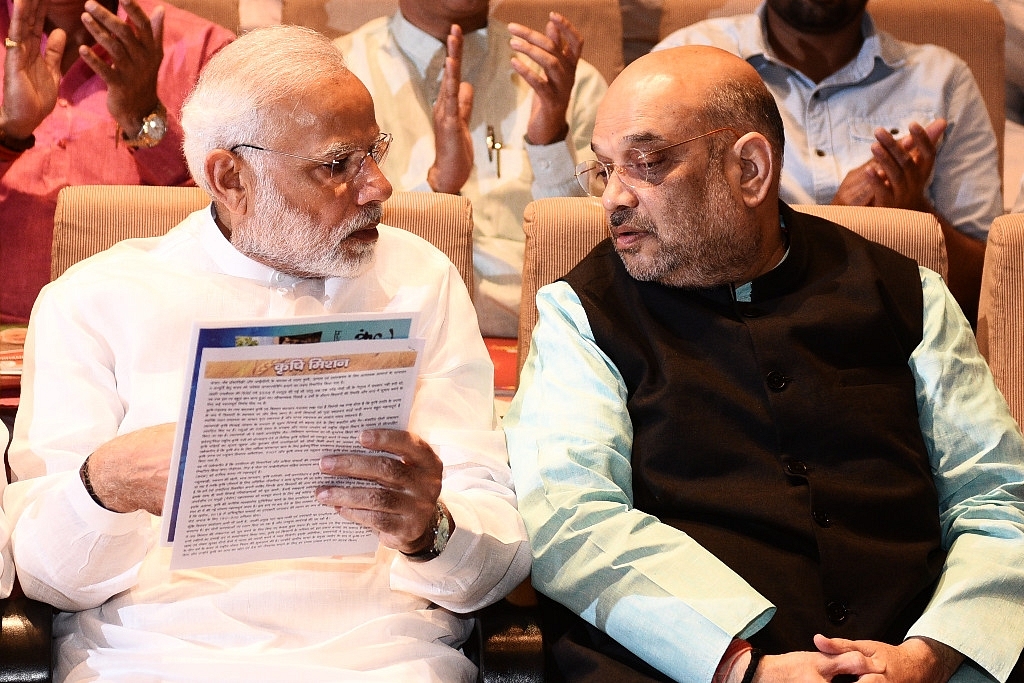Politics
BJP’s Citizenship Amendment Bill To Take In Hindu Refugees Sends Right Signal To Core Voter
- Irrespective of whether this bill will see that light of the day or not, one thing is clear: it will energise the BJP’s base.
- This is the first major law with a pronounced Hindu tilt, and rightly so.

Prime Minister Narendra Modi with BJP president Amit Shah. (Vipin Kumar/Hindustan Times via GettyImages)
With all opposition amendments to the Citizenship (Amendment) Bill being voted down in the Joint Parliamentary Committee (JPC) set up to vet the issue, the Bharatiya Janata Party (BJP) has – probably for the first time in this tenure – done something its core voter will be pleased with. The bill will allow persecuted Hindus and other minorities in our neighbourhood to settle in India – a key BJP manifesto promise.
The bill, which is by no means certain to become law, given the opposition majority in the Rajya Sabha, seeks to fast-track citizenship for minorities from our neighbouring countries (Pakistan, Bangladesh and Afghanistan) if they have been residing in India for six years, and even without proper documentation. The opposition objection to this amendment is that it names the minorities as Hindus, Sikhs, Jains, Buddhists, Parsis and Christians.
The exclusion of Muslims should not normally have sparked discord, for Muslims are not minorities in any of the above three countries, when the purpose of the amendment is to help persecuted minorities – and not economic migrants – to obtain citizenship. But such is the nature of Indian minority politics that this exclusion based on commonsense has become a bone of contention.
The bill also faces opposition in Assam and some north-eastern states, which believe that persecuted minorities from Bangladesh will end up demographically outnumbering locals over time. The BJP clearly has some tightrope walking to do here, especially in Assam, where it is the party in power. It may have to promise that some of those who are entitled to citizenship following the amendment can be settled in other states.
While the bill, if presented before the winter session ends, can cruise through the Lok Sabha given the BJP’s majority, it will face a roadblock in the Rajya Sabha. At best the BJP can count its own 73 MPs, three of the Shiv Sena, three of the Akali Dal, and some single-MP parties like the RPI to back the bill. The Janata Dal (United) of Nitish Kumar, which has not given up on the minority vote, may also be tough to convince on this issue, even though it is part of the NDA. At the very least, the BJP will need 40-45 more MPs to get the bill through.
The big question is whether it can do so by doing a deal with the AIADMK (13 MPs), the BJD (nine), the TRS (six), and the YSR Congress (two). Some nominated members of the upper house could also side with the BJP. Even then, the majority mark numbers look elusive.
But win or stalemate, one thing is clear: this bill will energise the BJP’s base. This is the first major law with a pronounced Hindu tilt, and rightly so.
The opposition is blackballing the amendment – which is a kind of dog whistle to its Muslim voter base.
Introducing ElectionsHQ + 50 Ground Reports Project
The 2024 elections might seem easy to guess, but there are some important questions that shouldn't be missed.
Do freebies still sway voters? Do people prioritise infrastructure when voting? How will Punjab vote?
The answers to these questions provide great insights into where we, as a country, are headed in the years to come.
Swarajya is starting a project with an aim to do 50 solid ground stories and a smart commentary service on WhatsApp, a one-of-a-kind. We'd love your support during this election season.
Click below to contribute.
Latest